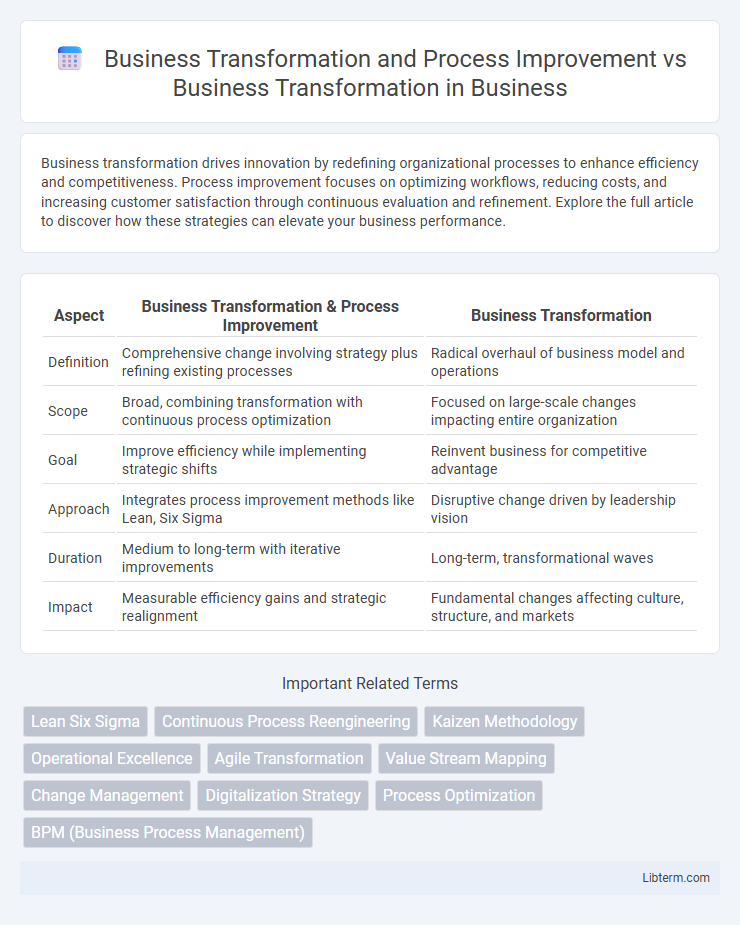Business transformation drives innovation by redefining organizational processes to enhance efficiency and competitiveness. Process improvement focuses on optimizing workflows, reducing costs, and increasing customer satisfaction through continuous evaluation and refinement. Explore the full article to discover how these strategies can elevate your business performance.
Table of Comparison
| Aspect | Business Transformation & Process Improvement | Business Transformation |
|---|---|---|
| Definition | Comprehensive change involving strategy plus refining existing processes | Radical overhaul of business model and operations |
| Scope | Broad, combining transformation with continuous process optimization | Focused on large-scale changes impacting entire organization |
| Goal | Improve efficiency while implementing strategic shifts | Reinvent business for competitive advantage |
| Approach | Integrates process improvement methods like Lean, Six Sigma | Disruptive change driven by leadership vision |
| Duration | Medium to long-term with iterative improvements | Long-term, transformational waves |
| Impact | Measurable efficiency gains and strategic realignment | Fundamental changes affecting culture, structure, and markets |
Understanding Business Transformation
Business Transformation involves a comprehensive change in an organization's strategy, culture, and operations to achieve long-term growth and competitive advantage, whereas Process Improvement focuses specifically on optimizing existing workflows for efficiency and effectiveness. Understanding Business Transformation requires recognizing its holistic impact on the entire enterprise, including technology adoption, organizational restructuring, and innovation management. Successful Business Transformation integrates process improvement initiatives within a broader strategic vision to drive sustainable change and improve overall business performance.
Defining Business Process Improvement
Business Process Improvement (BPI) is a systematic approach to analyzing and enhancing existing business processes to increase efficiency, reduce costs, and improve quality. Unlike broader Business Transformation, which encompasses comprehensive organizational change including culture, strategy, and technology, BPI specifically targets optimizing workflows and operational procedures. Effective BPI relies on methods such as Lean, Six Sigma, and continuous improvement to deliver measurable performance gains within the organization's current framework.
Key Differences: Transformation vs. Process Improvement
Business Transformation involves fundamental changes to a company's strategy, culture, and operations to achieve long-term growth, while Process Improvement focuses on optimizing specific workflows to enhance efficiency and reduce costs. Transformation is comprehensive and strategic, often driven by market shifts or innovation, whereas process improvement is tactical and targets incremental enhancements within existing processes. Key differences include scope--transformation alters the business model, process improvement refines business activities--and impact duration, with transformation delivering sustained change and process improvement yielding immediate operational benefits.
Strategic Goals of Business Transformation
Business Transformation focuses on aligning an organization's strategic goals with comprehensive changes in culture, operations, and technology to drive long-term growth and competitive advantage. Process Improvement targets specific workflows and efficiency enhancements within existing frameworks, contributing to incremental operational gains. Prioritizing strategic goals in Business Transformation ensures holistic organizational adaptability and innovation beyond isolated process optimizations.
Process Improvement: Scope and Focus
Process Improvement centers on enhancing specific workflows and operational activities within existing business structures, targeting efficiency, cost reduction, and quality enhancement. Business Transformation encompasses a broader scope, involving fundamental changes in organizational strategy, culture, and technology to achieve significant competitive advantage and long-term growth. While Business Transformation redefines the entire business model, Process Improvement hones in on incremental enhancements to specific processes for immediate performance gains.
Integration of Transformation and Process Improvement
Business Transformation integrates strategic change initiatives with continuous Process Improvement to enhance organizational agility and operational efficiency. By aligning transformation efforts with process improvement methodologies such as Lean and Six Sigma, companies ensure sustainable value creation and scalability across business functions. Effective integration accelerates innovation adoption, reduces costs, and improves customer experience through streamlined workflow redesign and technology enablement.
Benefits of Business Transformation Initiatives
Business Transformation initiatives drive comprehensive change by aligning organizational strategy, culture, technology, and processes to create new value and competitive advantage. These initiatives deliver benefits such as increased agility, enhanced customer experience, and accelerated innovation across the enterprise. In contrast, Process Improvement targets incremental enhancements within specific workflows, focusing on efficiency gains and cost reductions without fundamentally altering the business model.
Challenges in Optimizing Business Processes
Optimizing business processes during business transformation faces challenges such as resistance to change, lack of clear communication, and insufficient alignment between technology and organizational goals. Business transformation requires a holistic approach that integrates process improvement, technology adoption, and cultural shifts to achieve sustainable results. Overcoming these obstacles demands strategic planning, stakeholder engagement, and continuous monitoring to ensure that process optimizations drive overall business performance.
Metrics for Measuring Success
Business Transformation and Process Improvement prioritize distinct metrics to gauge success; Business Transformation focuses on broad organizational impact indicators such as revenue growth, market share expansion, and customer satisfaction scores. In contrast, Process Improvement metrics center on operational efficiency measures like process cycle time, defect rates, and cost savings. Integrating these metrics provides a holistic view of transformation effectiveness, balancing strategic growth with operational excellence.
Choosing the Right Approach for Your Business
Selecting the right approach between Business Transformation and Process Improvement depends on your organization's goals and scale of change. Business Transformation involves comprehensive, strategic changes that redefine business models and culture, while Process Improvement targets specific workflows to enhance efficiency and reduce costs. Analyzing your company's current challenges, resource capacity, and long-term vision ensures the adoption of the most effective strategy for sustained growth and competitive advantage.
Business Transformation and Process Improvement Infographic

 libterm.com
libterm.com